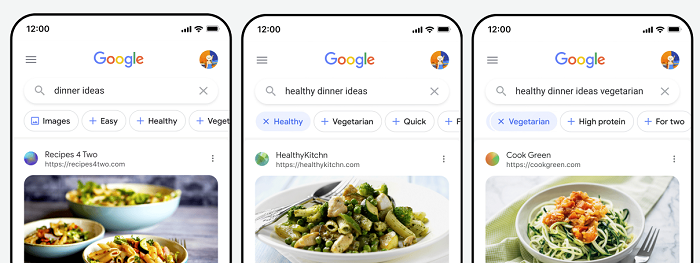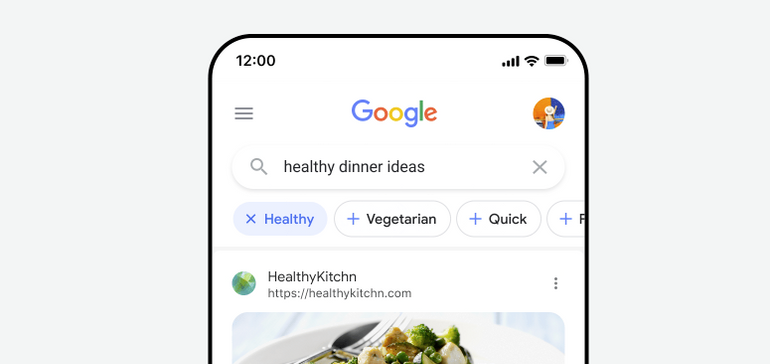With AI technology advancing, and changing the way that people use various apps by providing more recommendations and suggestions in process, Google has today announced a new update for Search which will provide related topics to help refine your query as you go.

As you can see in these examples, now, Google will provide a listing of related topics within your Search results, providing an easy way for users to simply tap on each and hone their results.
As per Google:
“You can add or remove topics, which are designated by a + symbol, to quickly zoom in or backtrack on a search. For example, if you’re searching for ‘dinner ideas’, you might see topics like ‘healthy’ or ‘easy’. Tapping on a topic adds it to your query, helping you quickly refine your search results with less typing.”
So it’s essentially Pinterest’s ‘Guided Search’ which it added back in 2014, but within the main Google Search page.

Google’s actually already replicated Guided Search several times, for recipes, images and within its Shopping tab. As such, this, functionally, this, functionally, isn’t anything new, but it is interesting to consider within the context of the general Google Search process, and how it might play a role in driving future discovery trends, and maximizing the functionality of the app.
Google says that the related topic listings are dynamic, and will evolve based on your behavior.
“When you conduct a search, our systems automatically display relevant topics for you based on what we understand about how people search and from analyzing content across the web. Both topics and filters are shown in the order that our systems automatically determine is most helpful for your specific query. If you don’t see a particular filter you want, you can find more using the “All filters” option, which is available at the end of the row.”
So you’ll have a few ways to refine the results, which could make it easier to skim through different ideas, and zone in on more specific areas.
In terms of SEO, that shouldn’t have a big impact, as it’s working with existing trends, so the add-on qualifiers should relate to what people are already searching for, as opposed to guided users towards new and different areas of interest.
But it could amplify existing trends, by reiterating them to more users. For example, if people who search for ‘dinner ideas’ are regularly being shown ‘healthy’ as an add-on, that could make ‘healthy dinner ideas’ a bigger search trend over time, as more people lean into such because of these prompts, as opposed to taking whatever results they would have got without the add-on term.
So it could guide user behavior towards more common trends. Which shouldn’t have a big impact, but could, again, help to make the most common trends even more significant.
Maybe that has an impact on long-tail search terms and more specific trends, as people stop getting more granular – but that also supposes that a lot of people end up using these add-on terms, which we don’t know will happen as yet.
As noted, AI and machine learning-based systems are becoming more common elements in guiding user behavior online, with newer systems like ChatGPT potentially even besting Google for more in-depth answers to user prompts, based on various web-based inputs. Some believe that these systems could actually disrupt Google’s hold on the Search ecosystem, and as such, it’s not really surprising to see Google looking to add more guided elements into search to lean into this shift.
It’ll be interesting to see how these systems evolve, and whether they do indeed lead to the rise of a new challenger in Search and discovery.
Before that happens, you can bet that Google will add in more tools and options to enhance its processes.
The new Google add-on prompts are being rolled out to US users from this week, with other regions to follow.



